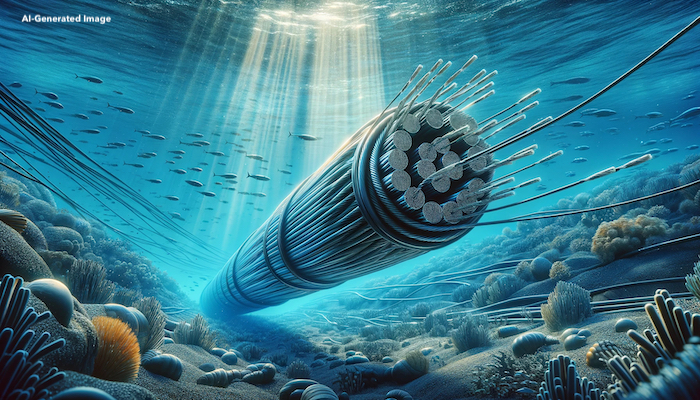The FCC on Thursday voted to begin a comprehensive review of submarine cable licensing rules – the first such review in decades. The Commission says the cables are vital infrastructure, carrying 98 percent of global internet traffic.
FCC Commissioner Geoffrey Starks said during the meeting that in 2020, he laid out the case for the agency to better secure cables “from bad actors who seek to block, intercept, or re-route internet traffic, or sabotage the cables altogether.” He said the risk isn’t theoretical.
“This past Sunday, a subsea cable between Lithuania and Sweden was cut, and just this Tuesday a submarine cable connecting Finland and Germany was also severed,” said Starks. “As reported, these actions appear to be purposeful as part of a ‘hybrid’ campaign that combines attacks on physical infrastructure along with cyberattacks.”
The cables, which transmit data between continents, are vital to global communications and economic activity, officials said. Since the agency’s last review in 2001, the technology, economics, and national security environments surrounding these systems have greatly changed.
FCC Commissioner Nathan Simington said the submarine cable item represents “technical modernization, national security, and bipartisan consensus. Just days ago in the Baltic Sea, we saw in real time just how vulnerable subsea communication is to sabotage from adversaries.”
FCC Chair Jessica Rosenworcel cited accounts of Houthi attacks in the Red Sea that may be responsible for cutting three cables that provide internet service to Europe and Asia. “While the details of these incidents remain in dispute, what is clear is that these facilities, with locations that are openly published to prevent damage, are becoming a target.”
She said the partnership of Australia, India, Japan, and the United States has a joint initiative to bolster the security of undersea communications. “It includes sharing information, increasing repair capability, and developing common standards to protect against physical threats and related cyber disturbances.”
There are 84 FCC-licensed cable systems and, as of December 2022, cable landing licensees reported more than 5.3 million Gbps of available capacity and 6.8 million Gbps in planned capacity for 2024, according to the FCC. In the Notice of Proposed Rulemaking unanimously adopted Thursday, the Commission seeks comment on how best to improve and streamline submarine cable rules to facilitate efficient deployment while ensuring the security, resilience, and protection of what agency officials call “critical infrastructure.”
Security review of license applications often involves numerous federal partners through the Committee for the Assessment of Foreign Participation in the United States Telecommunications Services Sector and with a critical role for the State Department. The agency wants to streamline the review process. Current cable landing license terms are 25 years. The Commission proposes shortening that, combined with a three-year periodic reporting requirement.
The FCC looks to update application requirements for national security purposes and ensure the Commission has correct information regarding the ownership, control, and use of a submarine cable system. The FCC is also looking to improve the quality of the circuit capacity data it collects from licensees and facilitate the sharing of such information with federal partners.
Under the proposal, for the first time, the FCC would require companies with international telecommunications authorizations to file renewal applications. It has proposed steps applicable to broadband providers to improve the security of the internet’s global routing system.
By Leslie Stimson, Inside Towers Washington Bureau Chief





Reader Interactions